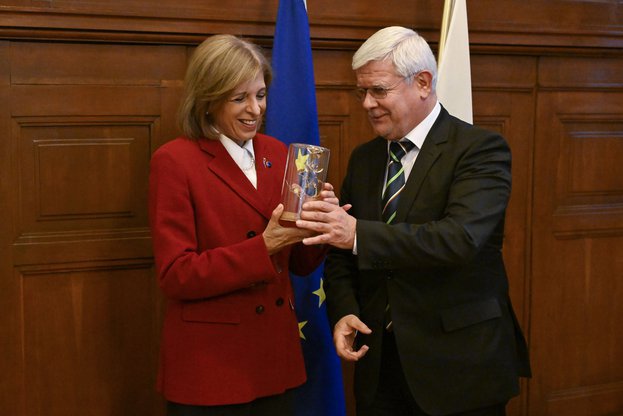
Minister of Agriculture and Food Kiril Vatev and EU Health and Food Safety Commissioner Stella Kyriakides discussed the efforts to combat African swine fever (ASF), animal welfare and the sustainable use of plant protection products at a meeting at the Ministry of Agriculture and Food. Deputy Minister of Agriculture and Food Alexander Iotsev and officials of the Bulgarian Food Safety Agency, the Executive Agency for Variety Testing, Field Inspection and Seed Control, the Risk Assessment Centre on Food Chain and other agencies also attended the meeting.
Bulgarian experts at the meeting informed the EU Commissioner on the numerous legislative and operational measures taken by Bulgaria since 2018 for ASF prevention and management. Currently, the country has a stable legislative framework ensuring prevention, early detection and control. Bulgaria is working in close communication with neighbouring countries for the setting up of a uniform control framework for the disease, especially in the border areas. A plan to control and prevent the spread of ASF has been developed and implemented as well as a strategic document that introduces a multidisciplinary approach and close cooperation between all interested parties for coordinated efforts to fight the disease.
Regarding animal welfare, reported that the new proposals from the European Commission on legislative amendments in the area of animal welfare are being discussed in the livestock sector. The experts presented a position that equivalent rules must be imposed on the import of animal products from third countries related to the manner in which the animals from which these products are derived have been raised. They also argued for the need of compensations for farmers and sufficiently long transition periods for adaptation to the new rules. The new EC legislative proposal related to the transport of live animals is expected to be released by the end of 2023.
At the meeting, Bulgarian position on the Proposal for a Regulation of the European Parliament and of the Council on the sustainable use of plant protection products was presented. The experts emphasized that Bulgaria does not support compulsory binding targets for the reduction of the risk from plant protection products mainly because some 85% of the arable land in this country is under cereal crops - and sunflower. They are treated with plant protection products only when necessary, which is why it is difficult to reduce the number of applications. If the reduction targets set in the Proposal remain binding, the variety of the species of crops raised in Bulgaria will change and will compromise Bulgaria's food security. In connection with food waste management, the hosts presented the objectives set in the National Programme to Prevent and Reduce Food Loss (2021-2026). Minister Vatev commented that the Bulgarian Food Bank has been operating in Bulgaria for 11 years, which takes care of the utilization of surplus food and its timely provision to people in need. Another topic of discussion was the Proposal for a Regulation of the European Parliament and the Council on plants obtained by certain new genomic techniques and their food and feed. Vatev stressed that Bulgaria has highly qualified scientists working in this innovative field.
"I would like to thank Minister Vatev for the meeting in Sofia today and for the extremely fruitful discussion. Bulgaria is an important partner for our work in the field of food safety and the "Farm to Fork" strategy. Dialogue and cooperation are crucial for the key areas we are discussing, including the sustainable use of pesticides and plant reproductive materials, new genomic techniques and the reduction of food waste. I look forward to working closely with Bulgaria to make progress on these important initiatives,” concluded Commissioner Kyriakides.
Minister Vatev thanked for the conversation and stated his willingness to continue the discussion on the issues raised, including within the upcoming meetings of the EU Council on Agriculture and Fisheries.